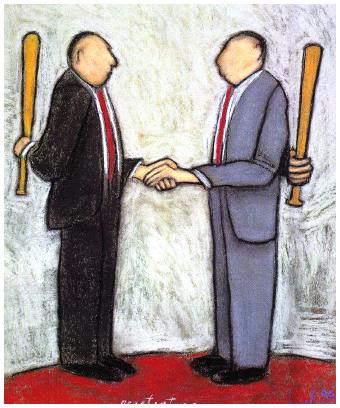Here’s Why People Gossip So Much
ssip helps police bad behavior in a social network and relieves stress. About 15% of office emails are gossip: According to some estimates, the average corporate email user sends 112 emails every day. About one out of every seven of those messages, says a new study from Georgia Tech, can be called gossip. Negative gossip is nearly 3 times as prevalent: Still, another finding was that "negative" gossip, characterized through a Natural Language Text Processing analysis, was in fact 2.7…
2 minutes
Here Are The 3 Steps For Getting People To Pay Attention To You
her excellent book 100 Things Every Presenter Needs to Know About People, Susan Weinschenk lays out a research backed 3 step process that really impressed me: 1) Start with what you know they believe. If you start your presentation with the opposite of what they believe, they may turn you off right away. For example, if you start a presentation to me by saying how amazing Android phones are or that Android phones are superior to iPhones, then you’ve…
2 minutes
How To Speak With Power
a The Charisma Myth: How Anyone Can Master the Art and Science of Personal Magnetism: Speak slowly. Visualize the contrast between a nervous, squeaky teenager speaking at high speed and the slow, emphatic tone of a judge delivering a verdict. Pause. People who broadcast confidence often pause while speaking. They will pause for a second or two between sentences or even in the middle of a sentence. This conveys the feeling that they’re so confident in their power, they trust…
2 minutes
The Best Way To Dress When You Want To Influence Someone
search shows you should either: 1) Dress formally or, 2) Dress like they do: Via The Charisma Myth: How Anyone Can Master the Art and Science of Personal Magnetism: In the 1970s, when young adults’ dress styles tended to fall into either the “hippie” or the “straight” category, researchers experimented with the effects of clothing choice. They approached college students on a campus, sometimes wearing hippie clothes and other times wearing straight clothes, and asked for change to make a…
1 min read
Here’s What Your Voice Tells Others About You
ople judge you by your voice in many ways. Via Subliminal: How Your Unconscious Mind Rules Your Behavior: The result: speakers with higher-pitched voices were judged to be less truthful, less emphatic, less potent, and more nervous than speakers with lower-pitched voices. Also, slower-talking speakers were judged to be less truthful, less persuasive, and more passive than people who spoke more quickly. “Fast-talking” may be a cliché description of a sleazy salesman, but chances are, a little speedup will make…
2 minutes
Your A to Z Guide To Influence, Persuasion and Negotiation
gotiating is an essential skill. Understand the seven pillars of effective influence. Believe that you can improve your negotiating skills and you can. Early on First impressions are an even bigger deal than you thought. A little spinning of the facts here can be a good thing. There is a home field advantage in negotiation. Even if you're not on home turf, making yourself at feel at home can give you some of that advantage. Be socially optimistic. Expect…
3 minutes
What is the best way to respond to someone in order to strengthen your relationship?
a Flourish: A Visionary New Understanding of Happiness and Well-being: Shelly Gable, professor of psychology at the University of California at Santa Barbara, has demonstrated that how you celebrate is more predictive of strong relations than how you fight. The chart above lays out the four ways of responding to good news. Only "Active and Constructive" builds relationships. It is engaged, enthusiastic, curious and has supportive nonverbal action. It's worth a second to think about which category your responses usually…
1 min read
The Key To Being Liked And Being More Influential
e key to being liked and being more influential is similarity. You like names better when they are similar to yours. You even prefer brands that merely share your initials. Birthdays are easier to remember when they are closer to yours. You even prefer people who move the way you do. Demonstrating that you have something in common with someone else makes them more likely to help you. Salesmen deliberately fake little similarities in order to influence you and connect…
2 minutes







